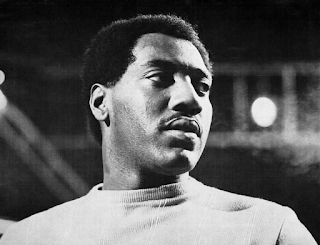Otis Redding: Rolling Stones #9 of The 200 Greatest Singers of All Time (2023)
Birth name:
Otis Ray Redding Jr.
Aka: The King of Soul
Born: September 9, 1941
Dawson, Georgia, U.S.
Died: December 10, 1967 (aged 26)
Madison, Wisconsin, U.S.
Occupation:
Singer-songwriter-musician
Instrument: Vocals
Years active: 1958–1967
Otis Redding is Number 21 on Rolling Stone's 100 Greatest Artists of All Time list from 2011. He ranks Number 9 on the publication's 2023 The 200 Greatest Singers of All Time. He has three songs on the Rock & Roll Hall of Fame's 500 Songs that Shaped Rock and Roll: "Shake," "Try a Little Tenderness," and "(Sitting on) The Dock of the Bay." His biggest hits, "I've Been Loving You (Too Long)" and "(Sitting on) the Dock of the Bay," is on Rolling Stone's 2004 list of 500 Greatest Songs of All Time.
I've Been Loving You (1965)
"I've Been Loving You (Too Long)" by Otis Redding is Number 111 on Rolling Stone's 500 Greatest Songs of All Time. It was his best-selling single and biggest hit while he was alive. Booker T. Jones, the famous multi-instrumentalist, played piano on this song. In October 2011, Jones told Mojo magazine,
"My experience has been a church player, and having had the classical experience, really helped there. The 'walk-ups' on those songs are classical type walk-ups, the way the chorus progresses to where the chromatics strike that emotion. Those were integral to me as a person and to the song."
Monterey Pop Festival (1967)
Otis Redding was the first soul artist with a predominantly white audience. He toured Europe, performing in London, Paris, and Stockholm. Redding was so popular in England that he ended Elvis Presley's eight-year reign at the top of Melody Maker's annual pop poll in 1967 when he was voted the "world's best male vocalist." In the United States, his last major appearance was at the Monterey Pop Festival in 1967. Held over three days during the height of the Summer of Love, the show included Jimi Hendrix, Janis Joplin, the Who, and the Grateful Dead.
Redding was the closing act on the second day of the festival. He delivered one of the most electrifying performances of the night. According to the book Performance and Popular Music: History, Place and Time: "...his performance at Monterey Pop was a natural progression from local to national acclaim, the decisive turning-point in Otis Redding's career." His set list included his own song, "Respect," a version of the Rolling Stones' "Satisfaction," and "I've Been Loving You," followed by the last song, "Try a Little Tenderness."
Try A Little Tenderness (1968)
Sam Cooke, Number 16 on Rolling Stone's 100 Greatest Artists of All Time, wrote, "Try a Little Tenderness." Redding adapted his version of "Try A Little Tenderness" from Cooke's rendition on the album "Sam Cooke at the Copa."
 |
| Otis Redding |
Initially, Redding didn't want to record this song, but Stax Records executives and his friends were constantly requesting it; he finally gave in. Redding taped it with a pleading vocal, thinking it wouldn't be released. That backfired. This version of "Try a Little Tenderness" became his signature song.
Postmodern Jukebox
Postmodern Jukebox, aka PMJ, is a rotating musical collective founded by arranger and pianist Scott Bradlee in 2011. PMJ reworks popular modern music into different vintage genres, especially early 20th-century forms such as swing and jazz. Two of their singers, Rogelio Douglas, Jr. and Brenna Whitaker, performed this classic Otis Redding hit on the "Live at Whitley House: Brat Pack Edition" video series. Whitley House is the Headquarters of the For the Record family of performers.
Death (December 10, 1967)
Redding died in a plane crash on December 10, 1967, when a plane carrying him and his backing band, the Bar-Kays, crashed into Lake Monona near Madison, Wisconsin. Only the trumpet player for the Bar-Kays survived. Redding's body was found the day after the crash, still strapped into his plane seat.
 |
| Redding plane crash in Lake Monona |
Sitting on the Dock of the Bay (1968)
Otis Redding wrote "(Sitting On) The Dock of the Bay" with Steve Cropper soon after listening to The Beatles album Sgt. Pepper's Lonely Hearts Club Band. He recorded it at Stax Records in Memphis three days before his death. Five months later, Martin Luther King, Jr. was shot in Memphis.
The record company pressured Cropper to finish this song as soon as word got out that Redding had died. Beach sound effects (waves, seagulls, etc.) were dubbed after the recording. The famous whistling at the end wasn't planned. Cropper explained on his website:
 |
| Otis Redding |
"If you're an Otis Redding fan, you'd know that he's probably the world's most extraordinary at ad-libbing at the end of a song. And this particular song baffled Otis a little because of the tempo and the mood, so when we got to the end of it, he didn't have anything to ad-lib with and just started whistling.
It was a month before the song was released, on January 8, 1968. March 16, 1968, Redding's recording of" (Sittin' On) The Dock Of The Bay" became the first posthumous number-one hit in Billboard chart history. It's number 26 on Rolling Stone's 500 Greatest Songs of All Time.
Sitting on the Dock of the Bay
Otis Redding






Comments
Post a Comment